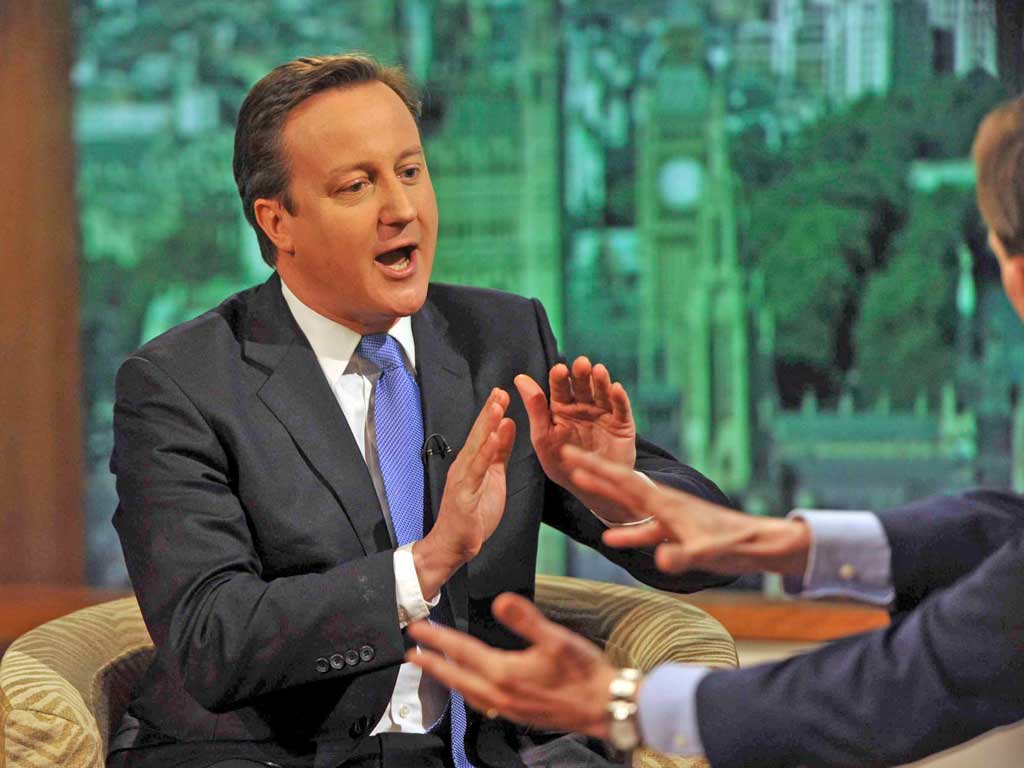Anger in Europe after Cameron warns euro crisis is far from over

Your support helps us to tell the story
From reproductive rights to climate change to Big Tech, The Independent is on the ground when the story is developing. Whether it's investigating the financials of Elon Musk's pro-Trump PAC or producing our latest documentary, 'The A Word', which shines a light on the American women fighting for reproductive rights, we know how important it is to parse out the facts from the messaging.
At such a critical moment in US history, we need reporters on the ground. Your donation allows us to keep sending journalists to speak to both sides of the story.
The Independent is trusted by Americans across the entire political spectrum. And unlike many other quality news outlets, we choose not to lock Americans out of our reporting and analysis with paywalls. We believe quality journalism should be available to everyone, paid for by those who can afford it.
Your support makes all the difference.David Cameron warned yesterday that the eurozone is facing a renewed threat of collapse as he blamed economic woes on the Continent for Britain's double-dip recession.
In comments which will infuriate other European leaders ahead of elections in France and Greece next weekend, the Prime Minister said Europe was not "anywhere near half-way through" its currency crisis. And he predicted that the euro could yet fall apart as countries such as Spain, Greece and Italy struggle to cope with the economic constraints imposed on them.
Yesterday, thousands of people took to the streets across Spain to protest against government cuts aimed at tackling a debt crisis that has pushed the country back into recession. Next weekend, voters will go to the polls in France and Greece in elections which are likely to boost opposition to austerity measures. Hedge funds are already anticipating François Hollande's likely victory next Sunday will lead to a sharp deterioration in markets' opinion of France's creditworthiness.
Against this background, sources in the European Commission described Mr Cameron's remarks as "unhelpful". "We do not agree with him," they added.
An adviser to the French presidential front-runner said: "With the British economy shrinking in the last quarter, Mr Cameron should perhaps give his attention to problems nearer to home. All European leaders, inside and outside the euro area, should be careful not to encourage market volatility by speculating about future difficulties." A German government source added: "I would say we are more optimistic than he is."
In an interview with the BBC, Mr Cameron said struggling economies across the Channel, which receive 40 per cent of UK exports, were harming Britain's prosperity. "What's happening in the eurozone is a massive tension between the single currency that countries are finding difficult to adapt to. It's going to be a long and painful process."
His remarks drew condemnation from Labour and senior Liberal Democrats. Lord Oakeshott of Seagrove Bay, the former Liberal Democrat Treasury spokesman in the House of Lords, suggested Mr Cameron was deliberately playing up the European crisis to distract voters from domestic problems. "It's unstatesmanlike for a British Prime Minister to rock the European boat to distract attention from his own troubles," he said. Ed Balls, the shadow Chancellor, said attempts to blame the eurozone for pushing Britain back into recession "just won't wash".
Join our commenting forum
Join thought-provoking conversations, follow other Independent readers and see their replies
Comments